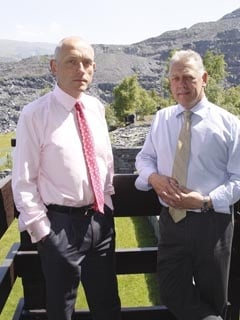Former Welsh//Slate Managing Director Chris Law, Operations Director Geraint Roberts and head of sales Paul Harvey have been sent to prison for fraud.
Confiscation proceedings will follow to remove benefits of the crime from the culprits, they will have to contribute to the prosecution costs and Chris Law and Geraint Roberts have been banned from being directors for four years and three years, respectively.
Chris Law was sentenced to 21/2 years, Geraint Roberts to 16 months and Paul Harvey to 10 months by Caernarfon Crown Court last month. They had previously pleaded guilty to charges of fraudulent trading.
Before the fraud was discovered, Welsh//Slate, owned by Alfred McAlpine at the time, were valued at £100million. After the discovery, the business was sold for £31million to Irish businessman Kevin Lagan.
The offences took place between 1 January 2004 and the time they were discovered in February 2007. They involved consistently overstating sales achieved by the company and included deceptions such as showing auditors piles of crates they said were full of roofing slates when in fact only the outer crates actually contained slates and those in the middle were empty.
Alfred McAlpine said at the time, and it was repeated during the trial, that the fraud had not been carried out directly to enrich the defendants, but to convey to the main board that Welsh//Slate was more successful than it was. This would ensure the defendants continued in employment and that they were left to carry on without interference.
During the period the fraud was taking place a new, £6million roofing slate factory was built at the Welsh//Slate headquarters in Penrhyn, but Chris Law told this magazine at that time he was proud that there had no been redundancies in spite of the considerable investment in machinery.
Following the discovery of the fraud and the appointment of Alan Smith to replace Chris Law, 160 of the 400 jobs at Welsh//Slate were immediately slashed.
The court heard that employees had been corrupted by being required to produce false invoices, delivery notes and rebate documents.
By the end of 2005, false invoices provided nearly 12% of turnover. In 2006 it was closer to 25%. And the Serious Fraud Office, which investigated, said that significantly understated the position because not all the false invoices were included.

